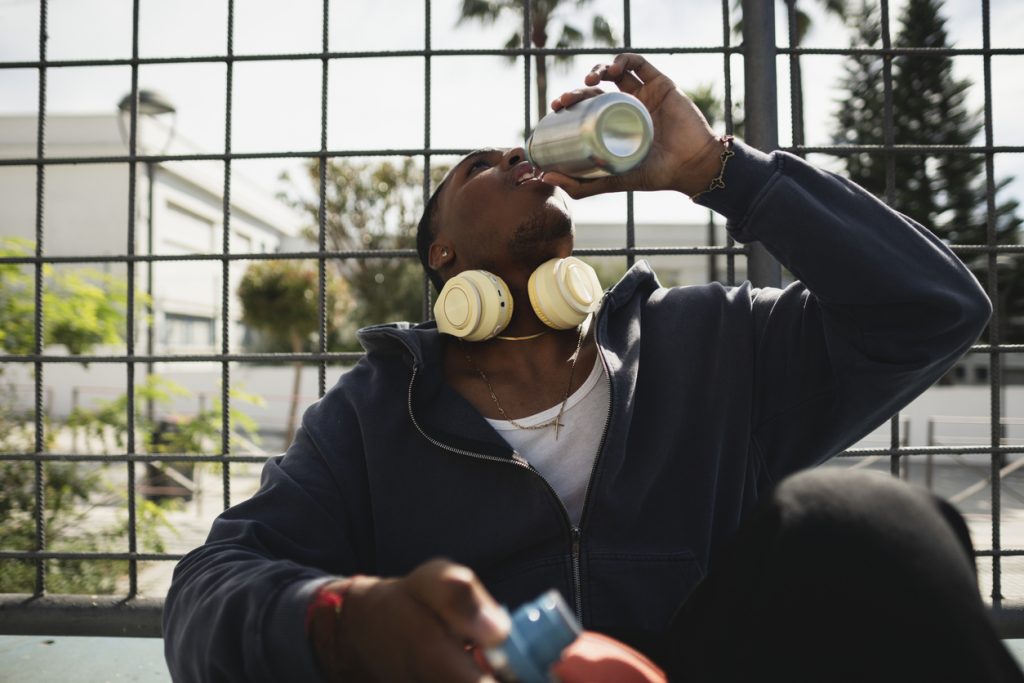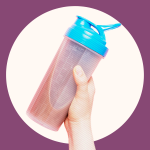They come in a flashy can, they’re fizzy, and they promise to power you through a 3pm slump or a late-night gym session. With celebrity endorsements and social media hype, energy drinks have become the go-to choice for a quick pick-me-up. But are they doing us more harm than good? Let’s strip away the marketing hype and unpack what’s inside the can, how it affects the body and what men need to know before cracking one open.
What’s really in your energy drink?
While they come with plenty of bells and whistles, there are some common ingredients found in the energy drink category. These include caffeine, guarana, taurine, sugar and B vitamins. Here’s a quick breakdown.
Caffeine
Caffeine is the primary stimulant found in energy drinks, and it has been well-researched. It has been shown to boost exercise performance and alertness, delay fatigue, improve muscle function and may marginally increase fat burning. It’s important to exercise moderation with caffeine use as too much can impact sleep and promote anxiety. Most energy drinks contain between 80mg and 300mg of caffeine per can – that’s the equivalent of one to three cups of coffee in a single serving.
Guarana
Add another caffeine hit into the mix. This plant extract also contains caffeine, so it’s often included in energy drinks. It’s a double dose. For men, an excessive intake of caffeine can disrupt testosterone production. Some studies have also linked high caffeine intake to reduced sperm quality but some do not.
Taurine
Taurine is a non-essential amino acid that plays several important roles in the body. One of them is supporting immune health and nervous system function. While the body can produce taurine on its own, it is also found in meat, seafood and dairy products. Taurine is often added to energy drinks and pre-workout formulas. It’s been linked to improved exercise performance by enhancing oxygen uptake, reducing muscle damage and promoting faster recovery. However, researchers believe these effects are small and inconsistent.
Sugar
It has to taste good, right? By sweetening the deal, energy drinks become much more appealing. Some energy drinks contain at least 10 teaspoons of sugar per can. In fact, one 500ml variety on the market has more than 20 teaspoons of sugar. Excess sugar can contribute to dental issues, weight gain, and alterations in the gut microbiome, as well as the inevitable crash that follows the initial high. Some energy drinks offer low-sugar or sugar-free alternatives, but these don’t deserve a health halo.
B vitamins
The claim that B vitamins directly boost energy isn’t scientifically valid. While they are involved in helping the body convert food into energy, they don’t create energy themselves. Unless you’re deficient, taking more than what is needed will be excreted (yes, that only makes expensive urine). B vitamins are readily available in the diet and can be found in a variety of foods, including fruits, vegetables, dairy products, whole grains and legumes. People at risk of a deficiency include the malnourished and alcoholics.

How do energy drinks affect the brain and body?
The promise of an energy hit may be alluring, but the physiological payback may have you thinking twice.
Increased heart rate and blood pressure
Thanks to high doses of caffeine (the guarana acts as a double whammy) energy drinks stimulate your central nervous system. The caffeine causes your heart rate and blood pressure to rise, which might not be an issue for some but can be problematic for those with underlying heart conditions or high blood pressure. There have even been case reports of heart arrhythmias and cardiac events linked to excessive consumption, especially in young, otherwise healthy men.
Sleep quality
We live in a fast-paced world and sleep has become a precious commodity. As a busy professional and dad to two little ones, I know how valuable sleep can be. Studies show that caffeine can increase the time it takes to fall asleep, reduce total sleep time, and lower sleep efficiency if consumed too late in the day. The half-life of caffeine is about five hours. However, caffeine’s elimination half-life can range from 1.5 to 9.5 hours. Therefore, it can disrupt your sleep. Chronic sleep disruption is associated with lower testosterone levels, which can impact energy, libido and body composition.
Mental health
There is consistent evidence from observational studies and case reports that heavy or chronic energy drink consumption is linked with increased risk of anxiety, depression, stress and other mental health issues, especially in adolescents and those with pre-existing vulnerabilities. And let’s not forget, they’re heavily marketed to this age group. But more research is needed to prove causation.
Poor sleep quality appears to be a major culprit, with research linking regular energy drink intake to increased risk of anxiety, mood swings, and difficulty with attention. Ironically, many young people rely on energy drinks to power through their day.
When mixed with alcohol
Mixing energy drinks with alcohol might be common, but it’s a risky combination. The caffeine in energy drinks can mask the sedative effects of alcohol, making you feel more alert than you really are. That false sense of sobriety can lead to drinking more, taking bigger risks and missing the signs that you’ve had enough. Research indicates that this combination is associated with higher rates of injury, dehydration, poor sleep and fatigue.
Other side effects
Headaches are a common side effect reported by individuals who consume energy drinks. Additionally, adverse events in adults include jitteriness, restlessness and stomach pain.
Let’s also differentiate between energy drinks and sports drinks. Energy drinks stimulate the central nervous system. Meanwhile, sports drinks are intended to hydrate, replenish carbohydrate stores and replace electrolytes lost through sweat. The two serve very different purposes, but clever marketing often blurs the line.
Energy drinks may promise a quick fix, but they can come with long-term consequences, especially when consumed regularly or in large quantities. From disrupted sleep and elevated stress levels to potential effects on heart health, mood and even fertility, the impact on men’s health is worth taking seriously.
It doesn’t mean you have to swear off caffeine altogether. However, true energy doesn’t come in a can. It stems from consistent habits, including getting enough sleep, eating well, staying active, staying hydrated and managing stress. It’s not as sexy, but it’s far more effective.
So, next time you need a little pick-me-up, grab a cup of coffee and a snack. Anything from a banana, a tub of yoghurt, a muesli bar, or cheese and crackers will give you some much-needed energy between meals or before the gym. Just skip the warm brew after midday or opt for a cup of decaf instead. It won’t give you wings, but it won’t leave you wired and crashing afterwards. That’s a win in my book.
















